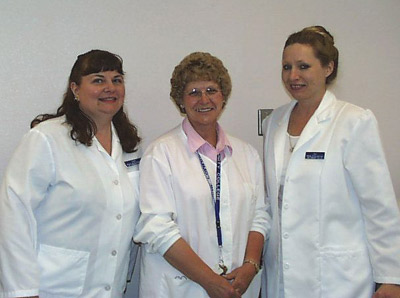Success Stories
Donations
Boost Medical Office Assisting Program
by Gloria Biersdorff
 |
Medical
Office Assistant student Diane Cromwell, left, with instructor Marty
Pittman and student Jule Cherosky. The MOA program continues despite
funding shortfalls, thanks to generous donations from the community. |
Thanks to
a deluge of public support, Lane Community College's Medical Office Assistant
program's vital signs remain strong and stable.
In fall 2002, the 34-year-old MOA program received a painful prognosis:
Because of budgetary constraints affecting all professional/technical
programs at Lane, the program needed to raise $60,000 or be cut from the
curriculum.
"I didn't think there was any way in the world we'd do it," admits recently retired program coordinator Joyce Garibay. But within the span of five months, donations ranging from $35 to more than $12,000 poured in. By the end of April the program had received $47,660.
"I see the success of their efforts as the incredible involvement of the advisory committee and the leadership of Dr. Kraig Jacobson, and of Joyce herself," says LCC Foundation director Janet Anderson. "This is a terrific example of a successful public-private partnership that benefits everyone -- students, the community, business, and employers."
Jacobson, Garibay and 12 other committee members worked to garner support from physicians, clinics, hospitals, pharmaceutical firms, medical management organizations, and insurance companies. The response, says Jacobson, was "nothing short of fantastic."
Lead gifts
were received from McKenzie Health Care, who donated $12,650; Springfield
Family Practice, PacificSource, Oregon Medical Group, GlaxoSmithKline,
PeaceHealth-Oregon Region, and Orthopedic Health Care, who each donated
$5,000; and Lane Independent Practice Physicians who contributed $3,000.
Physicians and supporters who contributed up to $500 include Applegate
Medical Associates, Kathy Bauman, Jeffrey D. Beckwith, Sarah Brendler,
Linda L. Church, Raymond N. Englander, Joyce Garibay, Kraig Jacobson,
Vern L. Katz, Nathan Markowitz, McKenzie Family Practice, Neurology Associates
of Eugene-Springfield, Eric G. Olson, Charles M. Pyfer, Gregory G. Richterich,
Robert M. Schauer, and Heather L. York.
The donations keep the program running for another two years while a longer-term strategy is developed.
"The MOA program is essential to providing an adequate base of employable health care assistants within our medical community," says Jacobson. "We already have a severe nursing shortage which would be further compounded by the loss of MOAs."
Also, he notes, Lane's program is the only one in the area accredited by the Commission on Accreditation of Allied Health Education Programs. "In the medical community it is essential that our staff have adequate certification and training. They receive this in the LCC program."
The intensive one-year-certificate program trains students in a broad spectrum of skills or "competencies" from performing electrocardiograms and capillary punctures to processing insurance claims and filing medical records. Maximum enrollment is 30; on average 22 to 24 students graduate each year, according to Garibay
Local job prospects are excellent, and the hourly wage for an experienced certified medical assistant ranges from $16 to $18. "Those who look find employment," she says. "Employers are snatching them up."
MOA graduate Jule Cherosky is one of several graduates who has already secured local, full-time work in the field. She praises the MOA staff, and instructors Marty Pittman and Garibay in particular, for their indefatigable commitment to student success. "All the teachers are very open to answering more questions, offering more support, a shoulder to cry on. Everyone in the program sees to it we're successful."
For more information on the MOA program call 463-5617, or visit http://2011sitearchive.lanecc.edu/instadv/catalog/fahealth/programs/medoffic.htm


